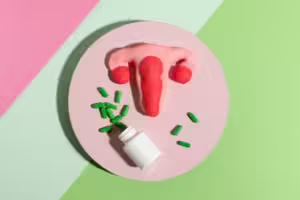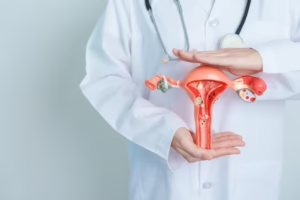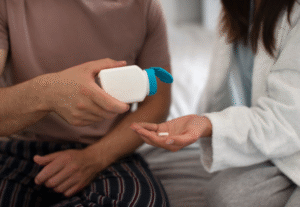
PCOS symptoms
PCOS, or Polycystic Ovary Syndrome, is a condition that affects many teenagers but often goes unnoticed. As a teenager, you may start noticing changes in your body that can be concerning, like irregular periods, weight gain, or acne. These early signs can be easily mistaken for normal teen changes, but understanding them is important. The earlier PCOS symptoms are recognised, the better the chance of managing it effectively.
If you’re wondering if you’re experiencing symptoms, it’s essential to be aware of things like excessive hair growth or difficulty losing weight. By recognising the early signs of PCOS, you can take action and work with a doctor to help manage the condition. So, let’s dive in and look at what to watch out for.
What Is PCOS, and Why Should You Care?

Polycystic Ovary Syndrome (PCOS) is a disease that causes an imbalance in the body’s hormones and has its early signs roughly around the teen years. That hormonal balance tends to be much higher than expected and could easily change everything from your periods to your skin and even your general health. If ignored, PCOS can lead to far more serious conditions like infertility, coupled with many other health issues.
As a teenager, it is important to know your body and start looking for those signs early. We can assure you that those early steps will be the only thing that matters in the upcoming years.
Read more: A Comprehensive Guide to Women’s Healthcare
Common PCOS Symptoms (You Shouldn’t Ignore!)

PCOS symptoms in teenage girls can be difficult to distinguish, as many changes, like breast development and menstruation, are part of normal adolescence. However, there are still certain signs worth paying attention to, which can help with early detection:
1. Irregular Menstrual Cycle: One of the Crucial PCOS Symptoms
If your periods skip for months, or if they occur less frequently than every 21 days or more, this can indicate irregular cycles or even ovarian issues. In fact, PCOS (Polycystic Ovary Syndrome) is often diagnosed based on the consistency of these irregularities. As mentioned earlier, periods in individuals with PCOS tend to be consistently abnormal or irregular.
2. Excess Hair Growth
Increased levels of male hormones, known as androgens, can lead to a condition called hirsutism. This results in unwanted hair growth, often in areas where men typically grow hair. You might notice thick, dark hair appearing on your face, like on the upper lip, chin, or jawline. In addition, hair may start to grow more thickly on your abdomen, back, or chest—areas where you typically wouldn’t expect it.
This pattern of hair growth can make you feel self-conscious, but it’s important to understand that it’s a common sign of PCOS. If you’re experiencing this, it could be one of the early indicators of the condition, which can be managed with the right care. Check out Harnaam Kaur’s story here:
3. Severe Acne and Oily Skin
Acne is still quite common during teenage years, as hormonal changes can trigger breakouts. However, when acne becomes stubborn and out of control, it could be more than just typical teenage skin issues. You may notice large, inflamed pimples appearing not just on your face, but also on your back or chest.
These pimples may feel painful and resistant to over-the-counter medications or even stronger treatments. If your acne persists despite trying various treatments, it could be a sign of something more serious, like PCOS. This type of acne, often deep and cystic, may require a different approach and professional treatment to manage effectively. If this sounds familiar, it might be worth consulting a doctor for further guidance.
4. Increase in Weight
70% of PCOS patients tend to be resistant to insulin. Insulin is known for causing the body to store fat and the result is excessive weight gain commonly seen around the abdomen or stomach. And this is caused by ovary complications so the diagnosis of PCOS is even more reliable.
This type of weight gain can be frustrating and harder to manage. It’s important to understand that insulin resistance is linked to hormonal imbalances. Because of this, the diagnosis of PCOS becomes more reliable when these signs appear, helping doctors identify the condition more effectively.
5. Hair Thinning Or Loss
Both thinning hair and hair loss, especially around areas like the crown or temples, are common issues for women experiencing abnormal hormonal cycles due to PCOS. This happens because of the hormonal imbalance associated with the condition, where androgens (male hormones) are produced in excess.
The increased levels of these hormones can cause the hair on your scalp to thin out, and in some cases, it may lead to noticeable hair loss. Unlike the usual hair shedding, this type of hair loss often occurs gradually and can be more difficult to reverse. If you notice thinning in these areas, it’s important to consult a healthcare professional to help manage and address the underlying hormonal imbalance.
6. Dark Colour Patches Of Skin
Velvety dark patches around the neck, armpits, and under the breasts are often an indication or symptom of developing PCOS (Polycystic Ovary Syndrome). These patches, known as acanthosis nigricans, appear due to insulin resistance, which is one of the common symptoms of PCOS. Insulin resistance occurs when the body doesn’t respond well to insulin, causing higher levels of the hormone in the bloodstream.
This excess insulin can affect skin cells, leading to the formation of these dark, velvety patches. If you notice these changes on your skin, it could be an early sign of PCOS. There is no reason to be alarmed when one or more of these symptoms is present –with early recognition and intervention, PCOS can be managed in a better way.
Also read: Lifestyle Changes for Managing PCOS for Unmarried Women
How Are the PCOS Symptoms Diagnosed?

A combination of methods is used by practitioners while diagnosing PCOS symptoms and the following details outline what to expect.
- Medical History: Polycystic Ovarian Syndrome, or PCOS, along with diabetes is a hereditary condition, your doctor might question you about this and want to know if you have experienced any weight changes or irregular menses.
- Physical Exam: The physical exam will include acne or excess hair growth among other visible symptoms of the disease.
- Blood Tests: The blood tests will focus on checking the hormones and determining whether patients are insulin-resistant or not. Book Your Next Blood Test Here!
- Ultrasound: The PCOS condition can be screened by using an ultrasound to look for small cysts present in the ovaries.
You can consult an endocrinologist or a gynaecologist without any hesitation if you feel you have PCOS. The first step to getting better is getting mobilised, and the time to get mobilised is now.
Why Acting Early Matters in PCOS?
Ignoring the symptoms of PCOS during your teenage years can lead to more serious complications later in life. If left unaddressed, the long-term issues associated with PCOS can significantly impact your health and well-being. These issues include:
- Infertility: PCOS can affect your ability to conceive because hormonal imbalances can make ovulation irregular or even impossible. This can reduce your chances of getting pregnant when you’re ready to start a family.
- Type 2 Diabetes: Insulin resistance, a common feature of PCOS, can increase your risk of developing type 2 diabetes over time.
You can now Measure Your Blood Sugar in the Comfort of Your Home (psst! That’s even under INR 1000) - Mental Health Struggles: The hormonal imbalances caused by PCOS can contribute to feelings of anxiety, depression, or low self-worth, making it harder to manage everyday life.
However, the positive news is that early intervention can help manage and reduce the impact of these symptoms. By acting early and seeking medical advice, you can better control your PCOS symptoms and prevent long-term complications.
Tips to Manage PCOS Symptoms
The following are a few lifestyle changes that can assist you in your treatment of PCOS:
- Balanced Meals: A balanced meal or a trendy Plant-based diet should consist of the following: Lean protein nuts, seeds, avocados, fresh fruits, vegetables and whole grains. Try to avoid processed meals, excessive junk food and sugary drinks should be avoided.
- Staying Active: Insulin barrier and hormone resistance. It may include walking, cycling, or yoga as well.
- Stress Management: Deep breathing, mindfulness and pursuing one’s favourite hobbies can help relieve stress and may moderately alleviate the symptoms associated with PCOS.
- Adequate Sleep: You should aim to get good sleep for 7-8 hours daily.
- Doctor Consultation: Follow your prescribed dosage for better results, and medication such as insulin-sensitisers and birth control pills may assist your body in better hormonal regulation as well.
Join the Reddit Threads to see how lifestyle changes PCOS girlies:
The classic “You need to lose weight.”
byu/No_Ostrich_691 inPCOS
Myth-Busting: Common Misconceptions About PCOS Symptoms
Myth I: PCOS only affects older women.
Truth: Many people believe PCOS is something that only impacts women later in life, but that’s not true. It often begins during the teenage years, as hormonal imbalances start to show up. If left unmanaged, the symptoms can continue into adulthood, affecting various aspects of your health.
Myth II: Losing weight will cure PCOS.
Truth: While weight management can certainly help reduce some symptoms and improve overall health, it’s important to understand that PCOS is a chronic condition. It doesn’t have a one-size-fits-all cure, and managing it requires long-term care, medication, and regular check-ups with a healthcare provider.
Myth III: Irregular periods are normal in teenagers.
Truth: During the teenage years, due to hormonal fluctuations, you can expect some irregularity in your periods. However, prolonged or severe irregularity could be a sign of something more serious, like PCOS. If you find that your periods are consistently irregular, it’s important to speak to a doctor for a proper evaluation.
Read Also: The Rise of AI in Fitness and Wellness Apps
Conclusion
Detecting the symptoms in teenage girls well in advance helps in managing the disease more efficiently. You should visit a healthcare professional for the diagnosis if you identify with any of these symptoms. Are there more of your concerns about this condition? Feel free to share your experience.
Frequently Asked Questions (FAQs)
1. What are the first signs of PCOS in teenagers?
The initial symptoms include an irregular menstrual cycle, severe acne, excessive hair growth on the body or face, and unexpected weight gain.
2. How long can PCOS delay your period?
High PCOS levels can lead to significant delays in menstrual cycles lasting several weeks or even months. A large number of women may menstruate only a few times in a year due to hormonal fluctuations.
3. What are PCOS symptoms in an unmarried girl?
Some of the symptoms include irregularity in menstrual cycles, growth of excessive hair on the body, acne issues, weight increase, and even bald patches due to thinning hair. Some of the women or girls who do not marry suffer too, as their symptoms are also unchanged.
4. What are the signs of PCOS in a child?
Signs of the disorder in prepubertal children can include early acne development, pubic hair development at an excessively young age and skin changes that show insulin resistance, including areas of darkness on the skin.






